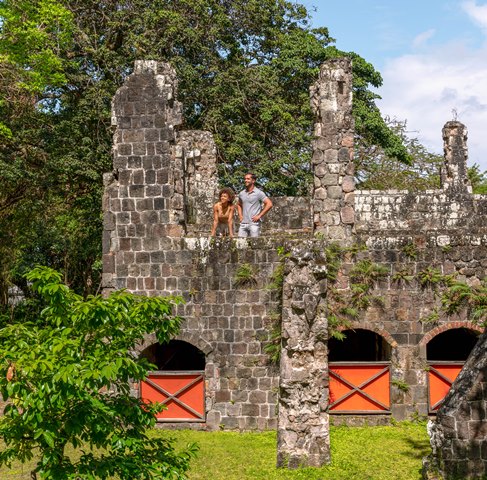By Debbie Ransome
Going beyond the basic storyline to dig deeper into the Haitian reality and how it gets reported, this

[The Wingfield Estate. Photo: courtesy St Kitts Tourism Authority]
St Kitts & Nevis has been an independent nation since 1983, yet only lately has it begun to emerge as a Caribbean tourism destination.
Until the early 21st Century, its economy was built on sugar, with all the dark colonial history that you might expect. Until about 200 years ago, its large plantations were worked by imported African slaves.
But now the dual-island nation, the smallest sovereign state in the Western Hemisphere, is telling the story of its relatively untouched cultural heritage to help it stand out in the region’s crowded vacationing offer.
“Tourism in St Kitts is relatively new,” Tourism Minister Marsha Henderson told Caribbean Intelligence© during the recent World Travel Market in London.
“We only went into tourism in 2004 after we closed the sugar industry. There is much authenticity about the destination itself.
“We’ve taken our stories from slavery and we offer them as part of our rich history.”
Unlike some of its neighbours, St Kitts, a mere 69 sq miles, retains King Charles II as its head of state – as does next-door Nevis, which is about half that size. According to the government website, the name St Kitts was originally St Christopher as the island moved from British and French colonial hands. The indigenous Kalinago people had called it Liamuiga, which translates as “fertile land”.
Its colonial names remain with an area called The Circus (inspired by London’s Piccadilly) and an Independence Square, formerly known as Pall Mall.
Faced with the demise of the sugar industry, St Kitts decided in the early 21st Century to start promoting itself to visitors. With that aim in mind, the islands have turned the uncovered 17th Century ruins of what they say is the Caribbean’s first working estate and rum distillery on the Wingfield Estate into a tourism destination. It’s listed by Lonely Planet as a must-see destination.
The island holds a carnival-style SugarMas across the November to January period. It even still runs a colonial double-decker train for a tourism trip along the north coast.
Ms Henderson said: “We have a number of ruins that still stand. We have a lot of rich cultural history that would have grown over the time with us and there is so much in the destination that is untouched.”
From plantation to delicacy
Caribbean Intelligence asked the minister how this was working out, now that the issues of sugar, rum and the associated slave trade have become such modern-day flashpoints.
“Our people understand and appreciate that we have a product that we have to let others know about,” she replied. “As much as it’s service-oriented, I think our people can distinguish from service. I think our people understand [the difference of] slavery from service.”
Where many Caribbean destination restaurants are proud of their high-end menus, the legacy of slave food is promoted here just as much as any posh menu.
“We were getting the pig foot, we were getting the pigtails, we were getting the scraps,” Ms Henderson said, referring to the food often passed on to slaves on plantations in the past. “We’ve taken that and turned them into delicacies and we offer that as part of our culinary experience,” she explains.
This means that while you still get the lobster meals and fine dining you’d expect at most of the Caribbean’s upmarket destinations, they also boast of their “no-frills seaside shed” in Old Road.
The sister island of Nevis is also offered as a day trip “off-the-beaten-track” destination. Tourists are encouraged to visit what has been a hideaway for high-profile people across the years, from Lord Nelson to Princess Diana.
You might want to visit Hamilton House, where Nevis-born Alexander Hamilton spent his early life before all that US constitution stuff. The travel marketing team shared the shock of Nevisians when crowds started packing on to their pocket-sized island following the success of the musical that bears his name.
As the marketing team promoted their product across London in late November, the message was clear – no mass tourism, come and immerse yourself in our history.
Ms Henderson summed it up for Caribbean Intelligence©: “Because of slavery, we have a rich history and culture. We have managed to use that to our advantage. We’ve taken a lemon and turned it into lemonade.”
By Debbie Ransome
Going beyond the basic storyline to dig deeper into the Haitian reality and how it gets reported, this
[photo: Patti Smith & Winston Rodney, cred Ted Bafaloukos]
In a year of global challenges and fall-out, we at Caribbean Intelligence© have focused on the aspirational side of Caribbean life.